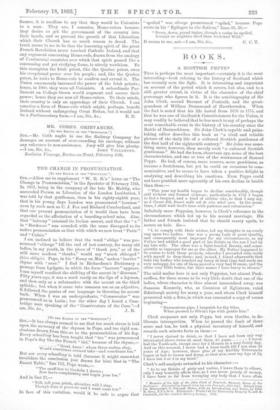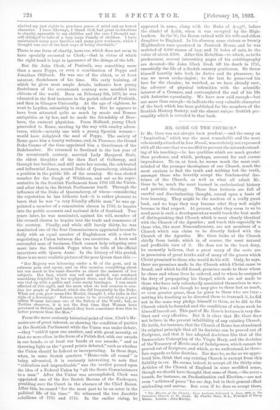BOOKS.
A SCOTTISH PEPYS.* THIS is perhaps the most important—certainly it is the most interesting—book relating to the history of Scotland which has recently seen the light. It is interesting and important on account of the period which it covers, but also, and to a still greater extent, in virtue of the character of the chief personage who figures in it. It is the autobiography of Sir John Clerk, second Baronet of Penicaik, and the great- grandson of William Drummond of Hawthornden. When the fact is noted that his life lasted from 1676 to 1755, and that he was one of the Scotch Commissioners for the Union, it may readily be believed that he has much to say of perhaps the most remarkable event in the history of his country since the Battle of Bannockburn. Sir John Clerk's capable and pains- taking editor describes this book as "a vivid and reliable picture of the daily life of a cultured Scottish gentleman of the first half of the eighteenth century." Sir John was some- thing snore, however, than merely such "a cultured Scottish gentleman." He had the keen, observant eye, some of the best characteristics, and one or two of the weaknesses of Samuel Pepys. He had, of course, more reserve, more pawkiness, as became a Scotcbman, but yet be could on occasions be com- municative, and he seems to have taken a positive delight in analysing and describing his emotions. Even Pepys could not have prattled more agreeably of his own decline in health than thus :— "This year my health began to decline considerably, though still without any formed sickness ; particularly in 1752 I began to feel a languor, and a kind of satietas Mite, so that I may say, as J. Ca3sar slid, Emori nate sed de vita nihtl cure. In the mean- time, I shall wait God's time with patience and submission." Infinitely more Pepysian, however, is Clerk's reference to the circumstances which led up to his second marriage. His father and friends insisted that he should marry again, to secure an heir. So— "I, to comply with their wishes, led my thoughts in an overly way upon two Ladies. One was a young Lady of great Quality, and consequently most improper for my circumstances, as my Father had settled a good part of his Estate on the son I had by my late wife. The other was a light-headed Beauty, and conse- quently as improper for me as the other. My Father happened to be averse to both these projects, whorefor I prevailed very easily with myself to drop them; and, indeed, I found afterwards that both the Ladies who touched my fancy at that time had made me very unhappy, for one of them proved a very bad Woman, and the other very little better, but their names I here burry in silence." The mild malice here is not only Pepysian, but almost Peck- sniffian, for there seems to be very little doubt that one of the ladies, whose character is thus almost innuendoed away, was Susanna Kennedy, who, as Countess of Eglintoun, ruled Edinburgh society for many a year, and whom Clerk himself presented with a flute, in which was concealed a copy of verses beginning— "Harmonious pipe, I languish for thy bliss, When pressed to Silvia's lips with gentle kiss."
Clerk surpasses not only Pepys, but even Goethe, in de- liberate introspection. When he passed the limit of three score and ten, he took a physical inventory of himself, and records each minute facts as these:— "I never choised to drink, so that I have not been aIn yn never intoxicated above twice at most these 40 years had the Tooth-ach, except once for 2 Mures in a very frosty day. And on this account, I never had a loose tooth till I was nearf 7 eoar520, years of Igo; however, these pins of my Earthly Tabernacle began at last to loosen and decay, so that now, near my itg I have but 3 or 4 in my head."
Clerk's self-analysis extended to his character :— " As to my Habits of piety and vertu°, I leave them to otherii, only I may honestly affirm that, as I was never greedy of money, I have been so far from wronging any body that I have often menwiro of tho Life of Stir John Clark of Fentioutik, Baronet, Baron of the Exchequer. Extracted by htmeelf front his own Journale,1678-1755 Edited from the Manuscripts in Penionik House, with an Introduction and Notes, by John M. Gray, F.S. 9 ,Soot. Edinburgh : Printed lit the University Press by T. and A. Constable, for the t'eottish history Society. 1992, abetted my just rights to purchess peace of mind and an honest character. I have likeways, I thank God, had great inclinations to charity, agreeable to my abilities and the care I thought my- self oblidged to take of a very large Family of children. I have maintained many poor families and many poor workmen, which I thought was one of the best ways of being charitable."
There is one form of charity, however, which does not seem to have specially occurred to Clerk,—that in virtue of which the right hand is kept in ignorance of the doings of the left.
But Sir John Clerk, of Penicuik, was something more than a mere Pepys, or even a combination of Pepys and Jonathan Oldbuck. He was one of the ablest, or at least astutest, Scotchtnen of his time. His early training, of which he gives most ample details, indicates how young Scotchmen of the seventeenth century were moulded into citizens of the world. Born on February 8th, 1670, he was educated in the first instance in the parish school of Penicuik, and then in Glasgow University. At the age of eighteen, he went to Leyden, ostensibly to study law. But he appears to have been attracted quite as much by music and Roman antiquities as by law, and he made the friendship of Boer- have, the eminent physician. From Holland, young Clerk proceeded to Rome, meeting by the way with sundry adven- tures, which—notably one with a young Spanish woman— would have delighted the soul of Pepys. The society of Rome gave him a hearty welcome, and, in Florence, the Grand Duke Cosmo of the time appointed him a Gentleman of the Bedchamber. He returned to Scotland in the last year of the seventeenth century, married Lady Margaret Stair, the eldest daughter of the then Earl of Galloway, and through her brother, and still more her cousin, the celebrated and influential James, second Duke of Queensberry, obtained a position in the public life of the country. He was elected member for the Burgh of Whithorn, and sat as its repre- sentative in the Scottish Parliament from 1702 till the Union, and after that in the British Parliament itself. Through the influence of the Duke of Queensberry, of whom—considering the reputation he has hitherto had—it is rather pleasant to learn that he was "a very friendly affable man," he was ap- pointed a member of a commission chosen in 1703, to inquire into the public accounts and national debt of Scotland. Two years later, he was nominated, against his will, member of the council chosen to inquire into the trade and commerce of the country. Finally, and while still barely thirty, he was nominated one of the four Commissioners appointed to confer daily with an equal number of Englishmen with a view to negotiating a Union between the two countries. A keen and successful man of business, Clerk cannot help relapsing once more into the Scottish Pepys when he tells of his official interviews with Queen Anne. In the history of this period, there is no more realistic picture of the poor Queen than this :—
" Her Majesty was labouring under a fit of the gout, and in ()Amain pain and agony, and on this occasion everything about her was much in the same disorder as about the meanest of her subjects. Her face, which was red and spotted, was rendered something frightful by her negligent dress, and the foot affected was tied up with a pultis and some nasty bandages. I was much affected at this sight, and the more when she had occasion to men- tion her people of Scotland, which she did frequently to the Duke. What are you, poor mean-like Mortal, thought I, who talks in the style of a Sovereign ! Nature seems to be inverted when a poor infirm Woman becomes ono of the Rulers of the World ; but, as Tacitus observes, it is not the first time that Women have governed in Britain, and indeed they have sometimes done this to better purpose than the Men," From the more seriously historical point of view, Clerk's Me- moirs are of great interest, as showing the condition of parties in the Scottish Parliament while the Union was under debate, —they " rubb'd upon one another, and with great severity, so that we were of ten in the form of a Polish diet, with our swords in our hands, or at least our hands at our swords;" and as throwing light on the "grand points debated," such as whether the -Union should be federal or incorporating. La these days, when, in some Scotch quarters "Home-rule all round" is being advocated, it is curiously interesting to note that "ridiculous and impracticable" was the verdict passed upon the idea of a Federal Union by "all the Scots Commissioners to-a, man." After the Union was accomplished, Clerk was appointed one of the five Scotch Barons of the Exchequer, presiding over the Court in the absence of the Chief Baron. After this, he ceased "for the most part to be an actor in the political life of his time." He witnessed the two Jacobite rebellions of 1715 and 1745. In the earlier rising, he appeared in arms, along with the Duke of Argyll, before the citadel of Leith, when it was occupied by the High- landers. In the '45, the Baron retired with his wife and eldest daughter to England. In his absence, some sixteen or twenty Highlanders were quartered in Penicuik House, and he was mulcted of 6,000 stones of hay, and 76 boles of oats, to the value of about £200. After this Rebellion—to which, as to its predecessor, several interesting pages of his autobiography are devoted—Sir John Clerk lived, till his death in 1755„ essentially the life of a Scotch country gentleman. He threw himself heartily into both its duties and its pleasures ; he was no mean archecologist ; to the last he preserved his love for the classics ; he watched, as we have already seer, the advance of physical infirmities with the scientific interest of a Cornaro, and contemplated the end of his life with Antonine equanimity. We have now said enough—but not more than enough—to indicate the very valuable character of the book which has been published for the members of the Scottish History Society, and the almost unique Scottish per. sonality which is revealed in that book.



































 Previous page
Previous page